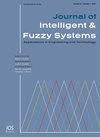一种基于机器学习的增强情感计算框架医疗物联网用于心理健康问题的高效先发制人决策
IF 1
4区 计算机科学
Q3 COMPUTER SCIENCE, ARTIFICIAL INTELLIGENCE
引用次数: 0
摘要
在全球范围内,年轻人死亡的两个主要原因是心理健康问题和自杀。心理健康问题是一种生理紊乱,它抑制了大脑的重要活动。在过去的几年中,患有精神疾病的人的数量大大增加。大多数精神障碍患者居住在印度。精神疾病会对一个人的健康、思想、行为或感觉产生影响。控制一个人的思想、情绪和行为的能力可能有助于一个人处理具有挑战性的环境,与他人建立关系,并解决生活中的问题。主要关注医疗保健领域和人机交互,通过生理和面部表情识别人类情绪的能力开辟了重要的研究思路以及面向应用的潜力。情感计算最近已经成为各个领域的专业人士和学者最感兴趣的研究领域之一。然而,尽管发表的文章有所增加,但对心理健康中情感计算的特定方面的评论仍然有限,并且存在一定的不足。因此,对印度使用情感计算来做出有关心理健康问题的决定的文献调查进行了讨论。因此,本文重点研究了传统技术如何通过利用深度学习和机器学习方法来监测和评估人类的生理数据,从而利用情感计算(AfC)来进行人类的情感识别(AR),情感计算(AfC)是计算机科学、人工智能和认知科学学科(如心理学和社会心理)的结合。本文章由计算机程序翻译,如有差异,请以英文原文为准。
An enhanced affective computing-based framework using machine learning & medical IoT for the efficient pre-emptive decision-making of mental health problems
Globally, the two main causes of young people dying are mental health issues and suicide. A mental health issue is a condition of physiological disorder that inhibits with the vital process of the brain. The amount of individuals with psychiatric illnesses has considerably increased during the past several years. The majority of individuals with mental disorders reside in India. The mental illness can have an impact on a person’s health, thoughts, behaviour, or feelings. The capacity of controlling one’s thoughts, emotions, and behaviour might help an individual to deal with challenging circumstances, build relationships with others, and navigate life’s problems. With a primary focus on the healthcare domain and human-computer interaction, the capacity to recognize human emotions via physiological and facial expressions opens up important research ideas as well as application-oriented potential. Affective computing has recently become one of the areas of study that has received the greatest interest from professionals and academics in a variety of sectors. Nevertheless, despite the rise in articles published, the reviews of a particular aspect of affective computing in mental health still are limited and have certain inadequacies. As a result, a literature survey on the use of affective computing in India to make decisions about mental health issues is discussed. As a result, the paper focuses on how traditional techniques used to monitor and assess physiological data from humans by utilizing deep learning and machine learning approaches for humans’ affect recognition (AR) using Affective computing (AfC) which is a combination of computer science, AI, and cognitive science subjects (such as psychology and psychosocial).
求助全文
通过发布文献求助,成功后即可免费获取论文全文。
去求助
来源期刊

Journal of Intelligent & Fuzzy Systems
工程技术-计算机:人工智能
CiteScore
3.40
自引率
10.00%
发文量
965
审稿时长
5.1 months
期刊介绍:
The purpose of the Journal of Intelligent & Fuzzy Systems: Applications in Engineering and Technology is to foster advancements of knowledge and help disseminate results concerning recent applications and case studies in the areas of fuzzy logic, intelligent systems, and web-based applications among working professionals and professionals in education and research, covering a broad cross-section of technical disciplines.
 求助内容:
求助内容: 应助结果提醒方式:
应助结果提醒方式:


